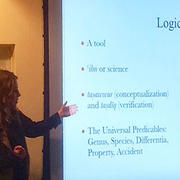
On Wednesday, February 3, Hadel Jarada, a PhD candidate in the Department of Near Eastern Languages and Civilizations and resident at the Center for the Study of World Religions, presented on the central components of Avicenna's (d. 1037) philosophy.
Born in the tenth century, Avicenna is commonly considered to be the greatest philosopher of the Islamic world and one of the greatest of medieval times. His immense impact on Islamic thought is evident in the hundreds of books written in response to different aspects of his philosophy in the post-classical period. What resounded as a result of his writing was such that Muslim philosophers and theologians ceased responding to Aristotle in order instead to engage with him.
In her presentation, Hadel began by delving into the context of Avicenna's life in order to show the multiple influences at work in the formation of his thought. She looked at the Greek philosophical and scientific course curriculum which became the standard regimen of study for practitioners of falsafa. She then delved into the Arabic philosophical tradition which had inherited the Neoplatonized Aristotelianism of antiquity and which saw itself as a continuation of that tradition. She then considered the Islamic political situation just before and during Avicenna's life, focusing on the translation of Greek works into Arabic from the beginning of the eighth century to the end of the tenth. Lastly, she contextualized Avicenna's philosophy in relation the theological heritage of Islam (kalam), scientific developments in Arabic, and the renaissance of the Persian language. In short, Hadel tried to show how Avicenna was a product of his time.
Hadel then considered Avicenna's philosophy proper, first beginning with his bifurcation of the sciences into theoretical and practical. She explained how Avicenna understands logic to be a tool in philosophical exploration. Taking logic as the entry into the philosophical sciences, Hadel explained the issues at play in physics and its derivative science, psychology, such as the relation between the human soul and body. Lastly, Hadel delved into metaphysics, the science of being qua being, which in many respects is the crowning achievement and culmination of Avicenna's philosophical system. Hadel ended with a note about the importance of Avicenna in intellectual history and his unparalleled impact on Muslim philosophers and theologians.
